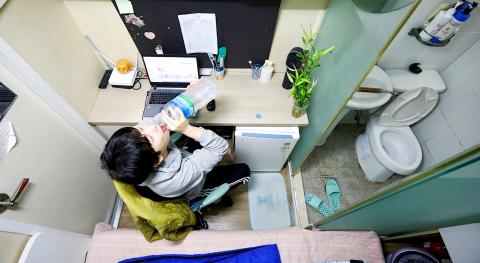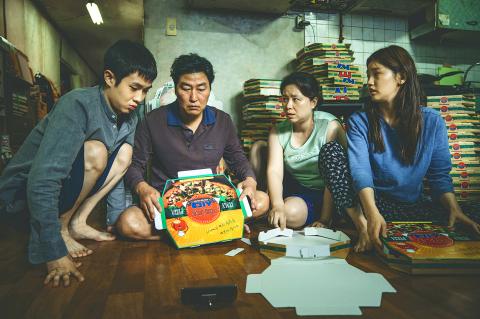Hwang Hyeon-dong lives in a 6.6-square-metre cubicle near his university campus in Seoul, which comes with a shared bathroom and kitchen plus all the rice he can eat, that he rents for 350,000 won (US$302) a month.
The sparse rooms, in premises called goshiwon, were previously mostly used by less well-off students to temporarily cut off from the outside world while they studied for civil service job tests.
Now they are increasingly becoming permanent homes to young people like Hwang, who identifies himself among the “dirt spoons,” those born to low-income families who have all but given up on social mobility.

Photo: Reuters
“If I try hard enough and get a good job, will I ever be able to afford a house?” said the 25-year-old, who lives in his small, cluttered room where clothes were piled on the bed. “Will I ever be able to narrow the gap that’s already so big?”
The concept of dirt spoons and gold spoons, as those from better-off families are known, have been around for many years but exploded onto the political scene in recent years, undercutting support for liberal President Moon Jae-in.
Moon came to power in 2017 on a platform of social and economic justice. Yet halfway through his five-year term, he has little progress to show the country’s youth who have borne the brunt of deepening inequality.

Photo: AP
Income disparity has instead widened since Moon took office, with the top income bracket now earning 5.5 times the bottom one, compared with 4.9 times before his inauguration, official data shows.
Hwang, who is in his third year majoring in media studies, said a corruption scandal surrounding former Justice Minister Cho Kuk was a wakeup call for dirt spoons like himself who may have once believed that hard work will make a difference.
Cho and his college professor wife were accused of using their positions to help their daughter gain admission to medical school in 2015.
Cho acknowledged he was a gold spoon and a “Gangnam liberal” motivated by social justice, but the approach backfired and he stepped down in October after only a month in the post. His wife is facing trial on allegations of forgery and financial fraud.
CUP RICE MEALS
To many struggling youth, the scandal — which fuelled some of the largest protests of Moon’s term — showed how gold spoons get further ahead with the help of their parents’ status and wealth.
In a September poll of 3,289 people by recruiting service provider Saramin, three-quarters of respondents said parents’ background was key to children’s success.
“I can’t complain that we have different starting lines,” said Kim Jae-hoon, 26, who also lives in a goshiwon cubicle.
“But it makes me angry that there are people who are getting help improperly. It’s OK that someone was studying when I had to be working, but the fact that they are getting improper help makes me angry.”
Kim works as a part-time waiter at a bar near his school and gets by on 400,000 won a month for rent, food and allowances.
Most meals are “cup rice” he prepares in the shared kitchen, menial fare of rice and basic toppings — eggs, half an onion and sauce.
Young, low-income voters like Kim have deserted Moon in record numbers.
Support among voters aged 19 to 29 dropped from 90 percent in June 2017 to 44 percent by October, according to a poll by Gallup Korea, while support among those considered on low-incomes has fallen 44 percentage points fall since mid-2017.
“President Moon’s been talking about equal opportunity, a level-playing field and justice. But, I feel a sense of betrayal because the current situation is far different from what he promised,” said Hwang, who voted for Moon.
Older workers are also feeling the pinch as Moon tries to improve employment opportunities and social justice for young workers.
In a televised town hall meeting last week, Moon conceded he had fallen short on those promises and said his declining support among youth was proof he had let them down.
POPULAR CULTURE
The idea of dirt spoons and gold spoons has resonated in popular culture in recent years.
The film Parasite directed by Bong Joon-ho about two families at the opposite ends of the social spectrum has been a smash hit at home and abroad, winning the Cannes Palme d’Or and touted as an Oscar “Best Picture” contender.
A popular fantasy digital cartoon called Golden Spoon features a poor boy swapping his family with his rich friend’s by eating with a magic gold spoon is set to be serialized as a TV drama.
Even the hit boyband BTS, known as a “dirt spoon idol” for their early struggles, tackles the social divide, singing “Don’t call me a spoon! I am just a human” in the song Fire.
Gold spoons are now a hot gift item, replacing gold rings traditionally given to children on their first birthdays, wishing them a wealthy life.
The fact that gold and dirt spoons are portrayed in popular culture in such a diverse range is reflective of the bitter hopelessness among the have-nots, said Kim Jong-min, the leader of civic group Youth Taeil, which supports young jobseekers and temporary workers.
“But, powerful people in the Moon government and the ruling party — they portray themselves as reformists, but they are just the same old politicians that are not listening to the suffering of the low-income class,” he said.

June 23 to June 29 After capturing the walled city of Hsinchu on June 22, 1895, the Japanese hoped to quickly push south and seize control of Taiwan’s entire west coast — but their advance was stalled for more than a month. Not only did local Hakka fighters continue to cause them headaches, resistance forces even attempted to retake the city three times. “We had planned to occupy Anping (Tainan) and Takao (Kaohsiung) as soon as possible, but ever since we took Hsinchu, nearby bandits proclaiming to be ‘righteous people’ (義民) have been destroying train tracks and electrical cables, and gathering in villages

Swooping low over the banks of a Nile River tributary, an aid flight run by retired American military officers released a stream of food-stuffed sacks over a town emptied by fighting in South Sudan, a country wracked by conflict. Last week’s air drop was the latest in a controversial development — private contracting firms led by former US intelligence officers and military veterans delivering aid to some of the world’s deadliest conflict zones, in operations organized with governments that are combatants in the conflicts. The moves are roiling the global aid community, which warns of a more militarized, politicized and profit-seeking trend

The wide-screen spectacle of Formula One gets a gleaming, rip-roaring workout in Joseph Kosinski’s F1, a fine-tuned machine of a movie that, in its most riveting racing scenes, approaches a kind of high-speed splendor. Kosinski, who last endeavored to put moviegoers in the seat of a fighter jet in Top Gun: Maverick, has moved to the open cockpits of Formula One with much the same affection, if not outright need, for speed. A lot of the same team is back. Jerry Bruckheimer produces. Ehren Kruger, a co-writer on Maverick, takes sole credit here. Hans Zimmer, a co-composer previously, supplies the thumping

Dr. Y. Tony Yang, Associate Dean of Health Policy and Population Science at George Washington University, argued last week in a piece for the Taipei Times about former president Ma Ying-jeou (馬英九) leading a student delegation to the People’s Republic of China (PRC) that, “The real question is not whether Ma’s visit helps or hurts Taiwan — it is why Taiwan lacks a sophisticated, multi-track approach to one of the most complex geopolitical relationships in the world” (“Ma’s Visit, DPP’s Blind Spot,” June 18, page 8). Yang contends that the Democratic Progressive Party (DPP) has a blind spot: “By treating any